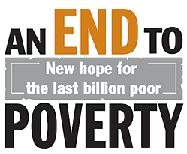
from the March 10, 2008 edition
A First Step for the Global Poor – Shatter Six Myths
Abject poverty takes a terrible toll. We can stop it. But we must start by separating fact from fiction.
By Mark Lange
Could it be possible to eradicate abject poverty in one lifetime? Ever since it was first asked, the question has seemed an improbable wish – a salve for the heart, untenable to the mind. But today, the answer is as clear as it is imperative: Yes.
The idea that every living person can have the basics essential to human survival – and from there, begin to climb the ladder of economic development – is a prospect within reach. It does not require a master plan that solves all the world's problems. It does demand that wealthy nations change their approach in ways both subtle and significant.
It also means that the world's poorest – the last billion people who barely survive on the equivalent of less than $1 a day – must turn from lifetimes of bleak experience and look with higher expectations toward what is possible.
Today, the "average" person on the edge of survival is a child. Within the next hour, 1,200 more of them will perish. There are no easy solutions. But there is a clear path toward progress.
What's mistaken
Let's start by unpacking a few myths that impair popular thinking about global poverty.
It's an intractable problem.
Not so. In 1981, 1.5 billion people survived on less than $1 a day, according to World Bank household surveys. By 2001, that number had dropped 27 percent, to just over 1 billion. That means well over 400 million people no longer face the lethal burden of extreme poverty. The diverging exception is sub-Saharan Africa, where rich nations must operate differently – and can.
There are too many impoverished people to help.
A bogus excuse. Historically, the world's poorest covered the globe. That's no longer the case. The mid-tier developing world in much of South and Central Asia is steadily and remarkably rising in prosperity. The last billion who suffer extreme poverty are concentrated in fewer than 60 very small sub-Saharan, Asian, and Latin American countries, which means we've never been in a better position to eradicate it.
Moral obligation is enough.
Apparently not. Alleviating suffering, the prevailing call-to-action among the G-8, nongovernmental organizations (NGOs), and celebrities, has not compelled adequate action on the part of developed nations. We need reasons that engage a broader political spectrum. Humanitarian, labor, and environmental goals must be joined with economic and geopolitical priorities, each in service to the other.
The boys of the last billion, fodder for African warlords and Saudi-funded extremist madrassahs, are prone to carrying chaos across borders. Post-9/11 terrorpolitik makes ending extreme poverty a security priority. The left responds to the promise of a more compassionate world; the right, to the threat of a more violent one. We must enlist both.
Page 1 2 3 Next Page

